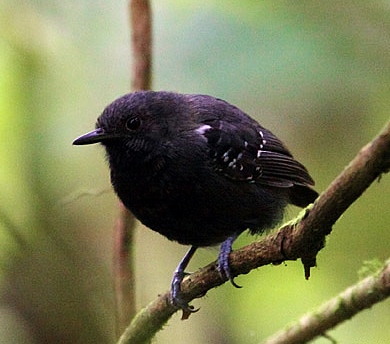 |
| Photo by Nick Athanas (Antpitta) |
Common name:
slaty antwren (en); choquinha-ardósia (pt); myrmidon ardoisé (fr); hormiguerito pizarroso (es); Hochland-ameisenschlüpfer (de)
Taxonomy:
Order Passeriformes
Family Thamnophilidae
Range:
This species is found from Guatemala to northern Venezuela and Colombia, along the western slopes of the Andes down to southern Ecuador and along the eastern slopes of the Andes down to southern Peru.
Size:
These birds are 10 cm long and weigh 9,5-10 g.
Habitat:
The slaty antwren is found in tropical moist forests, especially in mountainous areas, but also in lower areas, ranging in altitude between 900-2.400 m.
Diet:
They eat small insects and spiders, collected among the foliage and in moss covered branches.
Breeding:
Slaty antwrens breed in March-July. The nest is a deep cup made of black rhizomorphs, placed in an horizontal fork in a sapling, 1-2 m above the ground. There the female lays 2 white or cream-coloured eggs with brown, purple or reddish spots. The eggs are incubated by both sexes for 15-17 days. The chicks are fed by both parents and fledge 10-11 days after hatching.
Conservation:
IUCN status – LC (Least Concern)
This species has a large breeding range and a global population estimated at 50.000-500.000 individuals. The population is suspected to be in decline owing to ongoing habitat destruction in various parts of their range, but it is not considered threatened at present.







